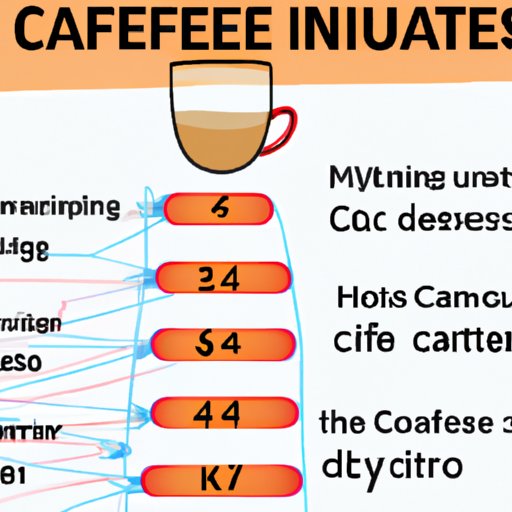Introduction
Caffeine is a natural stimulant found in coffee, tea, chocolate, energy drinks, and other foods and beverages. It is one of the most widely used stimulants in the world, and many people rely on it for a quick burst of energy or alertness. But how long does it take for caffeine to work? In this article, we’ll explore the science behind caffeine absorption and provide a comprehensive guide to understanding how quickly caffeine works.
A Guide to Understanding How Quickly Caffeine Works
When you consume caffeine, it is quickly absorbed into your bloodstream. According to a study by the National Institutes of Health, the effects of caffeine can be felt within 15 minutes of ingestion. After 45 minutes, the caffeine concentration in the blood reaches its peak level. The effects of caffeine can last up to six hours, depending on the amount consumed.
The Science Behind the Speed of Caffeine Absorption
Caffeine is absorbed through the small intestine and then enters the bloodstream, where it binds to receptors in the brain. This binding process triggers the release of neurotransmitters such as dopamine and norepinephrine, which are responsible for increased alertness and energy.
How Long Does It Take for Caffeine to Reach Its Maximum Effectiveness?
The speed at which caffeine is absorbed into the bloodstream depends on several factors, including the type of beverage consumed, the amount consumed, and the individual’s metabolism. In general, however, it takes about 30-45 minutes for caffeine to reach its peak effectiveness.
Factors That Affect How Quickly Caffeine Is Absorbed
There are several factors that can affect how quickly caffeine is absorbed into the bloodstream. For example, consuming caffeine on an empty stomach increases the rate of absorption. Additionally, drinking caffeinated beverages with food will reduce the speed of absorption. Other factors include age, gender, diet, and exercise.

Timing Your Caffeine Intake for Maximum Effectiveness
Knowing when to drink caffeine for maximum effectiveness is key to getting the most out of your caffeine boost. Caffeine is best metabolized in the morning, so it’s best to limit your caffeine intake to the first half of the day. Additionally, drinking caffeine later in the day can disrupt your sleep cycle, so it’s best to avoid consuming caffeine late in the afternoon or evening.
Effects of Drinking Too Much Caffeine
Although caffeine can have positive effects on alertness and energy levels, too much caffeine can have negative side effects. Consuming more than 400 milligrams of caffeine per day can lead to jitteriness, headaches, insomnia, and other health issues. It’s important to monitor your caffeine intake to ensure that you’re not drinking too much.

A Look at Different Factors That Affect How Long It Takes for Caffeine to Work
Age, gender, diet, and exercise can all affect how quickly caffeine is absorbed into the body and how long it takes for caffeine to work. Studies have shown that older adults tend to absorb caffeine more slowly, while younger adults may absorb it more quickly. Additionally, women tend to metabolize caffeine more slowly than men. Diet and exercise also play a role, as people who eat a healthy diet and exercise regularly may metabolize caffeine faster.

How To Get the Most Out of Your Caffeine Boost
To get the most out of your caffeine boost, it’s important to time your intake correctly and to understand how different factors can affect the speed of absorption. Here are some tips for getting the most out of caffeine:
- Limit your caffeine intake to the morning hours, as caffeine is best metabolized in the morning.
- Be aware of your individual sensitivity to caffeine; some people may need less caffeine than others to feel its effects.
- Avoid drinking too much caffeine, as excessive consumption can lead to negative side effects.
- Pay attention to your diet and exercise routine; eating a healthy diet and exercising regularly can help increase the speed of caffeine absorption.
Foods and Drinks That Contain Caffeine
Caffeine is found in many foods and beverages, including coffee, tea, energy drinks, soda, chocolate, and certain medications. When consuming these products, it’s important to pay attention to the amount of caffeine they contain. The Mayo Clinic recommends limiting your daily caffeine intake to 400 milligrams or less.
Conclusion
Caffeine is a widely used stimulant that can provide a quick burst of energy or alertness. Knowing how long it takes for caffeine to work can help you make the most of your caffeine boost. By understanding the science behind caffeine absorption and timing your caffeine intake correctly, you can maximize the effects of caffeine and minimize any negative side effects.
(Note: Is this article not meeting your expectations? Do you have knowledge or insights to share? Unlock new opportunities and expand your reach by joining our authors team. Click Registration to join us and share your expertise with our readers.)
